Books
|
 |
Water for Food, Water for Life
ed. David Molden, Earthscan, London and International Water Management Colombo: Institute, 2007
|
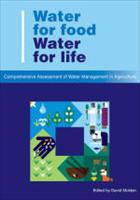 |
This assessment describes key water-food-environment trends that infuence our lives today and uses scenarios to explore the consequences of a range of potential investments. It aims to inform investors and policymakers about water and food choices in light of such crucial infuences as poverty, ecosystems, governance, and productivity. It covers rainfed agriculture, irrigation, groundwater, marginal-quality water, fisheries, livestock, rice, land, and river basins.
- Avail yourself of the Special Offer on the book - “Water for Food Water for Life”
- Order the entire book from Earthscan
- Summary in English. Click here to download (PDF 5MB)
- Summary in Arabic. Click here to download (PDF 1MB)
- Summary in Russian. Click here to download (PDF 2MB)
- Summary in Spanish. Click here to download (PDF 4MB)
- Summary in French. Click here to download (PDF4MB)
- Download the Chapters -
- 1 Setting the scene (PDF 656KB)
Authors: Jean-Marc Faurès, C. Max Finlayson, Habiba Gitay, David Molden, Lisa Schipper, and Domitille Vallée
- 2 Trends in water and agricultural development (PDF 3MB)
Lead authors: David Molden, Karen Frenken, Randolph Barker, Charlotte de Fraiture, Bancy Mati, Mark Svendsen, Claudia Sadoff, C. Max Finlayson
- 3 Looking ahead to 2050: scenarios of alternative investment approaches (PDF 3MB)
Coordinating lead authors: Charlotte de Fraiture and Dennis Wichelns
Lead authors: Johan Rockström and Eric Kemp-Benedict
- 4 Reversing the flow: agricultural water management pathways for poverty reduction (PDF 2.5MB)
Coordinating lead authors: Gina E. Castillo and Regassa E. Namara
Lead authors: Helle Munk Ravnborg, Munir A. Hanjra, Laurence Smith, and Maliha H. Hussein
- 5 Policy and institutional reform:
the art of the possible (PDF 1.5MB)
Coordinating lead author: Douglas J. Merrey
Lead authors: Ruth Meinzen-Dick, Peter P. Mollinga, and Eiman Karar
- 6 Agriculture, water, and ecosystems:
avoiding the costs of going too far (PDF 3.4MB)
Coordinating lead authors: Malin Falkenmark, C. Max Finlayson, and Line J. Gordon
- 7 Pathways for increasing agricultural
water productivity (PDF 2MB)
Coordinating lead authors: David Molden and Theib Y. Oweis
Lead authors: Pasquale Steduto, Jacob. W. Kijne, Munir A. Hanjra, Prem S. Bindraban
- 8 Managing water in rainfed agriculture (PDF 2MB)
Coordinating lead author: Johan Rockström
Lead authors: Nuhu Hatibu, Theib Y. Oweis, and Suhas Wani
- 9 Reinventing irrigation (PDF 3.2MB)
Coordinating lead author: Jean-Marc Faurès
Lead authors: Mark Svendsen and Hugh Turral
- 10 Groundwater: a global assessment of
scale and significance (PDF 1.6MB)
Coordinating lead author: Tushaar Shah
Lead authors: Jacob Burke and Karen Villholth
- 11 Agricultural use of marginal-quality water—opportunities and challenges (PDF 1.5MB)
Coordinating lead author: Manzoor Qadir
Lead authors: Dennis Wichelns, Liqa Raschid-Sally, Paramjit Singh Minhas, Pay Drechsel, Akiça Bahri, and Peter McCornick
- 12 Inland fisheries and aquaculture (1.6MB)
Coordinating lead author: Patrick Dugan
Lead authors: Vasu V. Sugunan, Robin L. Welcomme, Christophe Béné, Randall E. Brummett, and Malcolm C.M. Beveridge
- 13 Water and livestock for human development (PDF 1.8MB)
Coordinating lead author: Don Peden
Lead authors: Girma Tadesse and A.K. Misra
- 14 Rice: feeding the billions (PDF 1.7MB)
Coordinating lead author: Bas Bouman
Lead authors: Randolph Barker, Elizabeth Humphreys, and To Phuc Tuong
- 15 Conserving land—protecting water (PDF 1.7MB)
Coordinating lead author: Deborah Bossio
Lead authors: William Critchley, Kim Geheb, Godert van Lynden, and Bancy Mati
- 16 River basin development and management (PDF 2.7MB)
Coordinating lead author: François Molle
Lead authors: Philippus Wester and Phil Hirsch
|
Tropical Deltas and Coastal Zones : Food Production, Communities and Environment at the Land-water Interface
ed. C T Hoanh, B Szuster, K S Pheng, A Ismail, A Noble. CABI Publication, Wallingford UK and Cambridge MA USA, 2010 |
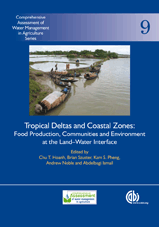
|
Historically, land and water mangement within many coastal deltas has focused on the exclusion of saline water flows that move upstream from the coast. However, this approach fails to recognize the diversity of rural livelihoods and ecosystems in coastal deltaic areas, the environmental consequences of altering natural saline water flows and the emergence of new activities such as shrimp farming that require brackish water. Focusing on the developing contries of Asia, Africa and South America, chapters explore the diverse livelihoods of people in these areas, the impact of land-water management on environments, new techniques and methodologies and lessons learned in land and water management to solve the conflicts between agriculture, aquaculture and fisheries.
|
River Basin Trajectories : Societies, Environments and Development
ed. F Molle, and
P Wester, CABI Publication, Wallingford UK and Cambridge MA USA, 2009 |
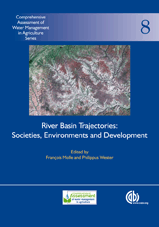 |
Using a variety of case studies, this book provides an overview of how societies have gradually developed their water resources and furthers our understanding of how such resources can be managed successfully or unsuccessfully. Discussing how and why particular options are selected, and why a particular course of events eventually prevails, the book stresses the importance of context and a multidisciplinary approach in moving towards sustainable and equitable development.
|
Rainfed Agriculture Unlocking the Potential
ed. S Wani, J Röckstorm, and T Oweis , CABI Publication, Wallingford UK and Cambridge MA USA, 2008 |
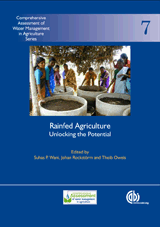 |
This book is based on research undertaken by a team of leading scientists from 10 global organizations. Chapters consider the potential of rainfed agriculture on the basis of case studies for different regions in Asia and Africa with the aim to assess the need of water for achieving food security and reducing poverty. Yield gaps for major rainfed crops are analysed globally and possible ways and means including technological, social and institutional options to bridge the yield gaps are discussed in detail.
|
| |
|
Conserving Land, Protecting Water
ed. D Bossio and K Geheb, CABI Publication, Wallingford UK and Cambridge MA USA, 2008 |
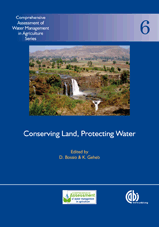 |
The degradation of land and water resources as a result of agricultural activity has had an enormous impact on human societies and economies. It is predicted that, by 2025, most developing countries will face physical or economic water scarcity, compounded by land degradation. In order to alleviate this problem, an advanced understanding of the state of our water resources and the relationships between land use, water management and social systems is needed.
|
| |
|
Community-Based Water Law and Water Resource Management Reform in Developing Countries
ed. B van Koppen, M Giordano, and J Butterworth, CABI Publication, Wallingford UK and Cambridge MA USA, 2007 |
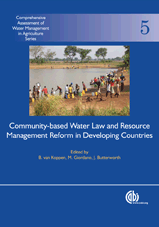 |
The lack of sufficient access to clean water is a common problem faced by communities, efforts to alleviate poverty and gender inequality and improve economic growth in developing countries. While reforms have been implemented to manage water resources, these have taken little notice of how people use and manage their water and have had limited effect at the ground level. On the other hand, regulations developed within communities are livelihood-oriented and provide incentives for collective action but they can also be hierarchal, enforcing power and gender inequalities. This book shows how bringing together the strengths of community-based laws rooted in user participation and the formalized legal systems of the public sector, water management regimes will be more able to reach their goals.
|
| |
|
Irrigation Water Pricing The Gap Between Theory and Practice
ed. F Molle and
J Berkoff , CABI Publication, Wallingford UK and Cambridge MA USA, 2007 |
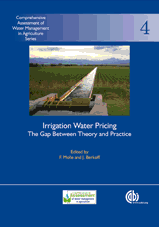 |
Much hope has been vested in pricing as a means of helping to regulate and rationalize water management, notably in the irrigation sector. The pricing of water has often been applied universally, using general and ideological policies, and not considering regional environmental and economic differences. Almost fifteen years after the emphasis laid at the Dublin and Rio conferences on treating water as an economic good, a comprehensive review of how such policies have helped manage water resources an irrigation use is necessary.
|
| |
|
The Agricultural Groundwater Revolution: Opportunities and Threats to Development
ed. M Giordano and KG Villholth, CABI Publication, Wallingford UK and Cambridge MA USA, 2007 |
 |
This book focuses on addressing the issues of using groundwater in agriculture for irrigation in the developing world, this book discusses the problems associated with the degradation and overexploitation of using it. It explores the practiced and potential methods for its management in the context of agricultural development.
|
| |
|
Environment and Livelihoods in Coastal Zones: Managing Agriculture - Fishery - Aquaculture Conflicts
ed. CT Hoanh, TP Tuong, JW Gowing and B Hardy, CABI Publication, Wallingford UK and Cambridge MA USA, 2006
|

|
This book focuses on the challenges people face in managing agricultural crops, aquaculture, fisheries and related ecosystems in areas of coastal zones in the tropics of Asia, Africa, Australia and South America. Challenges arise from conflicts in the use of natural resources among different stakeholders. Through many case studies, the book discusses the nature of these conflicts and identifies what is known and not known about how to manage them.
|
| |
|
Water Productivity in Agriculture: Limits and Opportunities for Improvement
ed. JW Kijne, R Barker, and D Molden, CABI Publication, Wallingford UK and Cambridge MA USA, 2003 |

|
In a large number of developing countries, policy makers and researchers are increasingly aware of the conflicting demands on water, and look at agriculture to be more effective in its use of water. Focusing on both irrigated and rain-fed agriculture, this book give a state of the art review of the limits and opportunities for improving water productivity in crop production.
|
|
Water-wise Rice Production
ed. BAM Bouman, H Hengsdijk, B Hardy, PS Bindraban, TP Tuong and JK Ladha International Rice Research Institute, 2002 |
 |
Proceedings from a thematic workshop on Water-Wise Rice Production held 8-11 April, 2002 at IRRI, Los Baños, Philippines. The workshop brought together scientists and irrigation system manager from several consortia and projects examining water scarcity in rice production.
|
|
|
|



